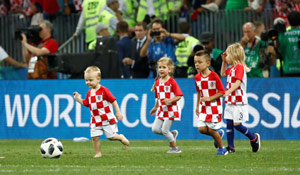Moscow: Long after Croatia beat England in the semifinal of the World Cup, five of the players' kids ran about on the empty pitch, kicking the match ball around. The Croatian supporters hadn't left the stadium. The bulk of them stood behind the goalpost where Mario Mandzukic scored the extra time winner, and sang their hearts away. And, every time one of the adorable toddlers ran towards the goal and nudged the ball into the net, the supporters roared in approval.
History had been made on this night, as Croatia reached their first FIFA World Cup final. The events of the day would be etched on to the minds of all those Croatian nationals present at the Luzhniki stadium. More so for those kids. They witnessed history, and they are the future of a country of just 4.5 million. Luka Modric and his troops are a golden generation. Perhaps a team that, just like the 1998 team did, inspire the next set of kids.
There is every reason for this band of achievers to be idolised. Battered, bruised and sapped of all energy, the Croatian team toiled, but displayed a determination that far exceeded their young and supposedly vibrant opponents. Dragged into extra time, for the third game in a row, Croatia were spent, both mentally and physically. But they simply wanted to win it more.
It is often said that football, or any sport for that matter, can be a healer of political and societal wounds for a nation. The 1998 World Cup had that effect on a country that was recovering from a war. Today, in a country steeped in corruption and so much negativity around, as one Croatian journalist told me, this victory comes as a welcome relief for so many people. There is positivity in the Zagreb air once again.
There is a fire in this team that makes them stand apart from most other teams at this tournament. During the game, Danijel Subasic, Sime Vrsaljko and Mario Mandzukic were all nursing some form of injury, while Ivan Rakitic was running a 102-degree fever. Ivan Perisic may have had the best night, but all four of them were instrumental in the victory. They may not be the best players in the world in their positions, but they were stars in their own right.
That, perhaps, proves the class of Modric and Rakitic. They can not only fit in with the best players in the world, like at their clubs, but they also make average teams, like this Croatian national team, look so much better. Even when compared to the reference point of midfield generals of this generation—Xavi and Iniesta—the Croatian two have proved their class in a mediocre team. That is something the Spanish duo never got an chance to do.
The Croats defeated a team with a raging self-confidence that was loudly backed by its fans, media and the football community. It was the massive hype in the media that irked Luka Modric, when he took a jab at the English media's lack of respect for the Croatian team. “People were talking... English journalists, pundits from television,” he said after the game. “They underestimated Croatia tonight and that was a huge mistake.”
During the game, between the time the second half started and Croatia's equaliser, the Croatians were getting angry with the English players for wasting time. One player even got off the bench and smacked a loose ball straight at a grounded Harry Kane, who wasn't far off. The referee missed it, or things would have gotten ugly. Things did go bad eventually, with the squabbling and bookings in extra time, but Croatia delivered the killer punch.
Despite sports history being littered with examples of underdog victories and fairytale runs to glory, the FIFA World Cup has always been somewhat immune to it. It was a paradise for the established giants of the game to come and stake their claim, in turns almost. That Croatia made it to the final puts to rest that tradition, and the World Cup gets that final piece of the jigsaw that it missed all along. The tournament becomes more relatable for the smaller teams.

Taken out of context, it could be said that the two finalists are the two best teams in the tournament. This couldn't be further from the truth. Both, Croatia and England were evenly matched, as were Belgium and France in the other semifinal. But, the gulf in class between the two games was visible. Could this Croatian side have beaten Germany, Brazil or Spain on their way to the final?
As is the norm, there will be more support for the underdog in a final like this. Croatia's chances of beating France are the lowest for a World Cup finalist since Czechoslovakia in 1962, the smallest country to reach the final and the lowest ranked to do so. Nothing appeals to the neutral more than an underdog.
That only adds to the motivation to upset a star-studded France. Every time Croatia scores a goal or wins a game the loud speakers at the stadium roar to life with a Croatian football anthem, 'Srce vatreno', as the crowd joins in. The title of the song translates to “heart of fire”. Could it be more apt?


